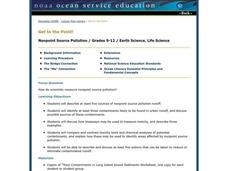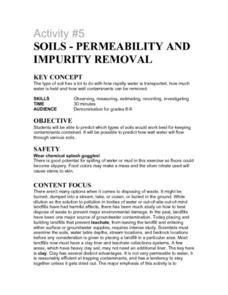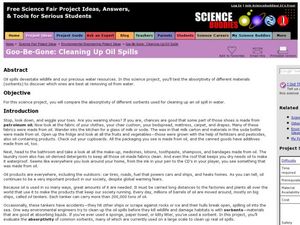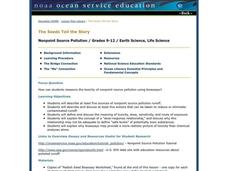NOAA
Why Should I Care?: Show How Increased Carbon Dioxide Makes the Ocean More Acidic
How does a change in pH affect the ocean ecosystem? Scholars explore the idea by making an acid-base indicator in part seven of the 10-installment Discover Your Changing World series. First, they explore impacts of carbon dioxide in...
University of Southern California
What's the Catch?
There must be a catch! A comprehensive lesson looks at ocean fishing concerns through a set of five hands-on activities. Learners become aware of the risks of seafood contamination and factors that have affected the ocean environment.
NOAA
It All Runs Downhill
Examine how pollution makes its way into an ocean with help from a model watershed. Scholars use household items to recreate a mini-watershed, equipped with pollutants, that when mixed with rain drain into a model's body of water. After...
DiscoverE
Water Pollution Cleanup
How do scientists determine the best method for removing pollutants from our water sources? Environmental scholars experiment with pollution clean-up options to discover which are the most cost-effective, fastest, and most thorough....
Curated OER
Get to the Point!
High schoolers write out sources of pollution and identify contaminants are most likely found in urban runoff. In this pollution lesson students compare toxicity tests and chemical analysis of potential contaminants.
Curated OER
Where's the Point?
Learners examine runoff for the causes, the impact, and the solution. In this investigative lesson students construct a three dimensional model of a watershed and provide information of contaminated runoff to their audience.
Curated OER
Oil Well That Ends Well
Focusing on the effect of oil spills on the environment, learners conduct experiments to explore this issue. First, they create an ocean environment using materials provided. Then, they make a simulated crude oil substance from vegetable...
Wilderness Classroom
Pollution
Educate scholars on pollution—air, water, and land—with a series of lessons that begin with a thorough explanation of each type. Learners then take part in three activities to reinforce the importance of reducing pollution. They...
Teach Engineering
Get the Word Out at McDonald's!
To get the word out that the Great Pacific garbage patch (GPGP) contains millions of pounds of non-biodegrading plastics, individuals research the GPGP and write an article for a newsletter. Researchers present their facts in a way that...
Teach Engineering
The Great Pacific Garbage Patch
The Great Pacific Garbage Patch is one of several garbage patches around the world where garbage accumulates naturally. As part of a GIS unit that combines oceanography, environmental science, and life science, class members investigate...
Curated OER
Water Pollution
Students explore the causes of water pollution. In this environmental lesson, students conduct experiments with natural filtration systems.
Curated OER
Activity #5 Soils-Permeability and Impurity Removal
Students predict which types of soils would work best for keeping contaminants contained. They comprehend that in the past, landfills have been one major source of groundwater contamination. Pupils comprehend that placing and building...
California Academy of Science
Pollution in Our Watershed
The concept of a how pesticides and other chemicals pass through a watershed can be difficult for younger learners to grasp without a concrete example. In the activity here, some blank paper, markers, and a spray bottle are all you need...
Curated OER
Cleaning up an oil spill
Small groups complete a science project involving cleaning up an oil spill. In this experiment, pupils use 4 different sorbents to discover which one absorbs the most oil. Afterward, they make a data table.
Marine Institute
Water Pollution
Sixth graders investigate the various types of pollutants found in water and ways to help prevent water pollution. Through a hands-on experiment, young scholars create samples of polluted water by mixing water with vegetable oil, dirt,...
Bridge
Mercury - Mercury is Rising
Hold a discussion in your class about the increase in mercury being found in fish that are caught commercially as food for humans. Given a worksheet, learners then calculate how much fish a person can safely eat each month to remain...
Curated OER
The Gulf Oil Spill Provides Many Learning Opportunities
You can use math and engineering lesson plans to delve into the affects of the recent oil spill.
Curated OER
Dirty Mud
Learners examine geological information to study benthic marine habitats. In this watershed project, students examine wetland habitats and land uses in a watershed. They will use geological information to discuss the impact of pollution...
Curated OER
Water in the Environment
In this water in the environment worksheet, students match 10 terms related to water to their definitions. They identify 10 sentences as true or false related to groundwater, layering and landfills. They fill in the blanks for 2...
Curated OER
Do You Have Change?
Learners analyze data and complete a worksheet about land use change in a coastal region. In this land use lesson, students discuss events that cause land use changes in coastal areas. They construct a change table to summarize data on...
Curated OER
Oil Market Basics
In this natural resources worksheet, students take a ten question quiz based on their knowledge of the oil market. This a multiple choice quiz.
Curated OER
The Seeds Tell the Story
Young scholars explore sources of pollution runoff and actions that can be taken to reduce runoff. In this pollution lesson students complete a worksheet and see why bio-essays may provide a more realistic picture of toxicity.
Curated OER
Water Words Puzzle
In this water activity, students fill in the blanks to a crossword puzzle having to do with water words. Students complete 25 blanks in the crossword.
Curated OER
Knowledge Quiz: Bacteria
In this bacteria quiz worksheet, students complete a set of 10 multiple choice questions covering a variety of concepts related to bacteria. A reference web site is included for additional resources.

























